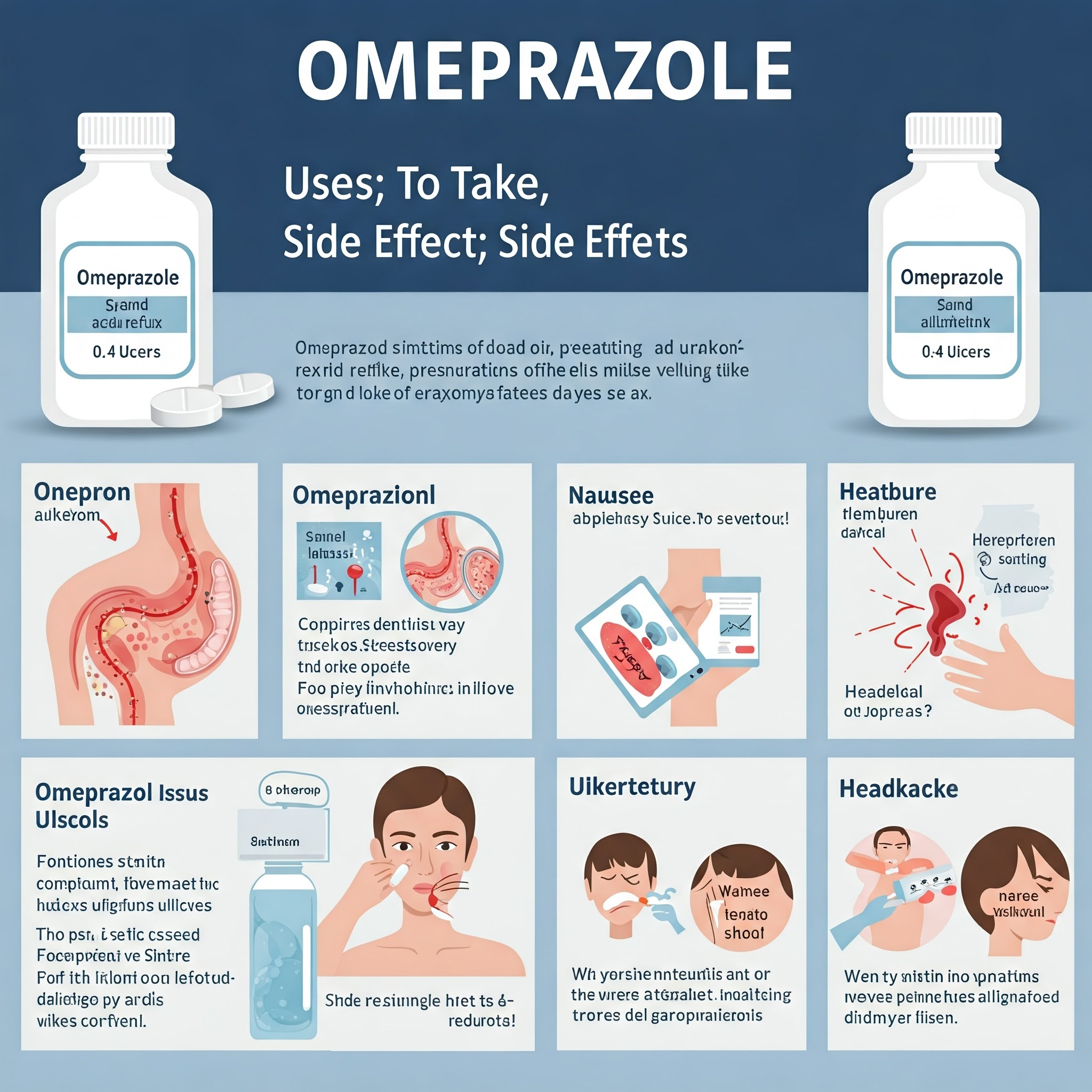Omeprazole: uses, how to take, side effects
- Info
- Apr 22, 2025
- 112 views

Omeprazole is a medication that belongs to a class of drugs known as proton pump inhibitors (PPIs). These drugs work by reducing the amount of acid produced in the stomach. Omeprazole is used to treat a variety of conditions, including heartburn, acid reflux, and ulcers.
What is Omeprazole Used For?
Omeprazole is used to treat a number of conditions, including:
- Heartburn and Acid Reflux: It can provide relief from the symptoms of heartburn, such as burning chest pain, and reduce the frequency of acid reflux episodes.
- Peptic Ulcers: It can help heal both gastric ulcers (in the stomach lining) and duodenal ulcers (in the upper part of the small intestine).
- Gastroesophageal Reflux Disease (GERD): Omeprazole is often used for long-term treatment of GERD, a chronic condition where stomach acid flows back up into the esophagus.
- Zollinger-Ellison Syndrome: A rare condition causing excessive stomach acid production.
- H. pylori Infection: In combination with antibiotics, omeprazole can help eradicate the H. pylori bacteria, which can cause ulcers.
How to Take Omeprazole
- Dosage: The dose of omeprazole will vary depending on the condition being treated and the individual patient. It is important to follow your doctor's instructions carefully.
- Timing: Omeprazole is typically taken once daily, usually in the morning, before eating.
- Administration: Omeprazole comes in different forms, including delayed-release capsules and orally disintegrating tablets. You should take the medication exactly as prescribed by your doctor.
- Duration of Treatment: The duration of treatment with omeprazole will vary depending on the condition being treated. In some cases, it may be taken for only a short period, while in others, it may be necessary to take it for months or even years.
Side Effects
Like all medications, omeprazole can cause side effects. Some common side effects include:
- Headache
- Nausea
- Diarrhea or constipation
- Abdominal pain
- Dizziness
More serious side effects are less common but can occur. These include:
- Bone fractures: Long-term use of PPIs like omeprazole may increase the risk of bone fractures.
- Kidney problems: In rare cases, omeprazole can cause kidney problems.
- Low magnesium levels: Long-term use can lead to a deficiency of magnesium, which can cause muscle cramps, weakness, and abnormal heart rhythms.
- Increased risk of infections: Omeprazole can interfere with the body's ability to fight off certain infections, such as pneumonia and C. difficile-associated diarrhea.
- Vitamin B12 deficiency: Long-term use can lead to a deficiency of vitamin B12, which is essential for nerve function and red blood cell production.
Precautions
- Pregnancy and Breastfeeding: Talk to your doctor before taking omeprazole if you are pregnant, planning to become pregnant, or breastfeeding.
- Other Medications: Omeprazole can interact with other medications, including blood thinners, antifungal medications, and certain HIV medications. Tell your doctor about all medications you are currently taking.
- Long-Term Use: If you are taking omeprazole for an extended period, your doctor may want to monitor you for potential side effects.
- Stopping Treatment: Do not stop taking omeprazole suddenly without talking to your doctor, as this could worsen your condition.
Disclaimer: This article provides general information about omeprazole and should not be considered medical advice. Always consult with a qualified healthcare professional for personalized diagnosis, treatment, and management of your health condition.
Remember: If you experience any side effects, contact your doctor or healthcare provider immediately.
Please Note: The information in this article is for educational purposes only and should not be considered a substitute for professional medical advice. Always consult with a qualified healthcare professional for any health-related concerns or questions.
Related Post
Explore leading pharmaceutical formulation companies in India through Medicef Pharma Insights. Stay informed and elevate your understanding of the market.
Explore the synergy of CO-AMOXICLAV and Lactic Acid Bacillus. Uncover their roles in promoting health and fighting infections effectively.
Discover how beta-lactam antibiotics combat bacterial infections by disrupting cell wall synthesis. Learn about their mechanisms and effectiveness today.
Explore our premium ready-to-compress granules designed for tablet formulation. Achieve optimal results in your production with our innovative materials.
Discover how we ensure quality pharmaceuticals remain affordable, making healthcare accessible for all. Explore our commitment to excellence and value.
Discover the comprehensive guide to Amoxicillin and Clavulanic Acid Sachet BP. Learn about its uses, benefits, and important dosage information for effective treatment.
